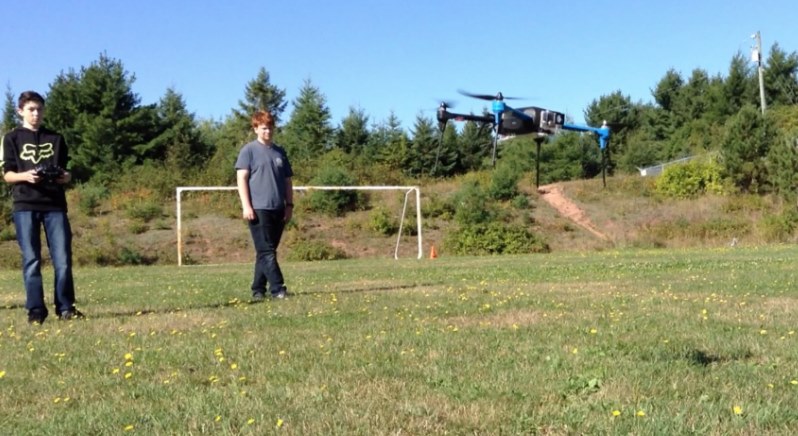
Articles
ISTE Standards–Which Tend to Be Broad, and Not Prescriptive–Benefit the Motivated Tech Teacher
By Henry Kronk
June 01, 2018
Last month, eLearning Inside news reported on Washington implementing new technology learning standards for their state K-12 education system. Washington educators did not write them. Instead, they adopted the widely acclaimed International Society for Technology in Education (ISTE) technology standards. Taking into account the dropping performance of U.S. students based national and international testing, and considering the often-vague nature of ISTE’s standards, we questioned the rigor of the standards. In certain districts and classrooms, it might not be the ideal governing document. But for highly motivated, creative, and up to date tech teachers, it’s a different story.
Benjamin Kelly teaches technology at the Caledonia Regional School near Moncton, New Brunswick. (He was the subject of a previous article about using Minecraft for game-based learning in the classroom.) About seven years ago, he came to a critical point in his career.
“I was doing the traditional tech program. I started to look around and I said, ‘If I’m going to stick out my career in this building, this isn’t good enough for me. The real life changing moment came when I asked ‘How is our little, rural school known? How is it known throughout the province?’ And the answer I got was, ‘We’re a pretty good Division B basketball team.’
(In Canada, high school sports divisions go AAA, AA, A, B.)
“I remember staring at the person and saying, no really, how are we known?”
“I realized at that point that our school needed to be on the map for something more than being a fourth-level basketball team. And I said, let’s try to make our edtech program not only known in the province, but let’s push it.”
“So I got involved in ISTE and the discussion happening on Twitter. So I’m pretty aware of what’s going on in the world right now—not just New Brunswick or Canada, but the world. And so when I come to work in the morning, I’m trying to make my program world-competitive vs. what the district is saying, that I should be at this standard.”
To be clear, New Brunswick doesn’t use ISTE. But Kelly participates in the community and is a huge supporter of the organization’s standards. He also finds himself in a situation where he has wiggle room without them.
The New Brunswick technology curriculum is designed such that a majority of courses must follow guidelines up to grade 10. Both during and following those lessons, Kelly does what he can to bring in new tech.

Grade 11 and 12 electives “are pretty much 90-minute open slates because the person who created the course didn’t get too specific about what was required,” Kelly said. So you basically walk that line of what the suggested things to do in the course are and you bend them to your will. So kids in grades 11 and 12 can pretty much do 40 hours of drones. They can switch to Unity, they can do Hololens work, anything they want really.”
New Brunswick’s Provincial Standards Work for Kelly, but they Could Be Better
“They’re not abreast. There’s a guy from the New Brunswick University and he was just heralded and tasked with coming up with NB’s own digital literacy strategy. And the whole time I was reading the article I was like, “Uh, ISTE has standards, and they’re a little more widely accepted.’ So I found it funny. I’m all for this guy doing the work, but there are also plenty of organization with standards already. So why are we recreating the wheel? Why don’t we just look at those and tweak them to suit New Brunswick.”
Canadian Edtech Groups Have Made Significant Contributions
“Our country has some amazing standards being thrown out there by C21 and others,” Kelly said. “ISTE is taking are looking at these standards and taking the best of them and putting them together. ISTE just has the mighty power of their size behind them.”
“If a school has somebody in a technology post who’s not even half as into it as I am, they’re not even looking at standards. They’re still introducing PowerPoint 25 years as the base block to a Grade 9 class. And that’s still happening in our own province. I think the teachers on social media really are starting to get sucked into it with discussions and chats at night, they get shown new things and then they dive into it themselves. But teachers who are just scheduled in—and this is a problem everywhere, teaches who get penciled in because there was no one else to teach technology—they’re doing the bare basics. They’re doing what they think is right, but they’re certainly not taking the time to look up digital literacy standards and they’re certainly not paying the price I’m paying in four weeks to fly to Chicago to attend a conference that charges $700 CAD just for the right to be there.”
“But it is happening. It’s one of those things where the principal says, ‘suck it up for the team, get in there and teach tech.’ And you really have to ask the question: what are the students getting there vs. what are the kids getting here?”









No Comments